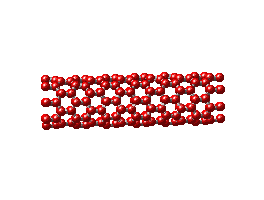Carbon Nanotubes
 Transistors are the main building blocks
when it comes to electronics, no doubt about it, but if they are not connected
to each other, what good are they?
Transistors are the main building blocks
when it comes to electronics, no doubt about it, but if they are not connected
to each other, what good are they?
Normally, transistors and other electronic components are connected with copper wires,
or even more often with thin copper tracks, but this method doesn't work for
molecular electronics.
Though in science labs molecular transistors are obviously connected to the other equipment for
testing purposes, it wouldn't do if one wants to connect a few million molecular transistors
in one chip. Here's why: if one imagined normal copper wires as thousand lane highways, then lab
connections would look like a thousand lane highway that is reduced into a two lane road that is
reduced by one lane at a time. That would be a pretty long reduction. In any case, from a scientific
point of view there are far more sizable problems with metallic wires. For example, they
overheat and can become unusable if they are too small. Another problem is that they have
relatively high resistance when they get really small, meaning that they cannot transmit electric signals
efficiently.
© 2006 M. Busuttil, I. Kandikov, M. Lubrick, J. Mutus, J. Nantais